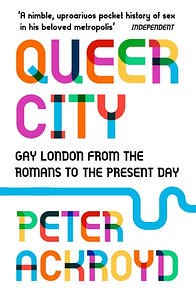You need to sign in or sign up before continuing.
Take a photo of a barcode or cover
adventurous
emotional
informative
medium-paced
informative
lighthearted
fast-paced
informative
slow-paced
Of course concentrates on male experience.
Also conflates same sex love and non so sensual sex, including with minors, with very little explanation of the mores of the time.
Disturbing.
Also conflates same sex love and non so sensual sex, including with minors, with very little explanation of the mores of the time.
Disturbing.
informative
reflective
slow-paced
Peter Ackroyd's Queer City feels a bit like a list, somehow. There is analysis there, but it really just feels like a long list of evidence, sources, people -- and mostly people being punished for being queer, in some sections, because that's the only evidence he found. I found it a quite tedious read, unfortunately, despite the boistorous gay scene he describes.
...And mourns, as he seems to feel that queerness being more acceptable (more acceptable when he wrote this than now, in some ways) has led to a loss, to a vigorous community settling down. It's not clear he thinks that's a good thing, as a gay man himself.
I would give three warnings about this:
1. He defines "queer" weirdly and incorrectly as being a catch-all term for people who are unsure where they stand. I promise you, I'm very sure, but refer to myself as queer because I prefer it for a number of reasons. It's a plastic term and often an umbrella term, and it doesn't mean what he said it means. At other times he uses it differently, but I definitely sat up and took notice when he defined "queer" that way, i.e. definitely wrongly. Someone who says they're queer might mean that they don't know exactly what to call themselves, but that doesn't mean that holds for everyone who is queer.
2. Where he's ostensibly discussing gay men, he's often discussing paedophilia and rape. He makes no distinction between the two. He doesn't offer comment on it or judge it.
3. The final chapter-ish hasn't aged very well; there's something rather sceptical about his tone towards the spectrum of gender queerness, and he also clearly does not foresee the tide of transphobia that has left Britain (and therefore London, the "queer city" he focuses on) to be referred to as "TERF Island". I got the sense that he might be one of those people who think it's gone "too far" himself.
Overall, I didn't find it enjoyably written, and I also have... questions... about the author's opinions.
...And mourns, as he seems to feel that queerness being more acceptable (more acceptable when he wrote this than now, in some ways) has led to a loss, to a vigorous community settling down. It's not clear he thinks that's a good thing, as a gay man himself.
I would give three warnings about this:
1. He defines "queer" weirdly and incorrectly as being a catch-all term for people who are unsure where they stand. I promise you, I'm very sure, but refer to myself as queer because I prefer it for a number of reasons. It's a plastic term and often an umbrella term, and it doesn't mean what he said it means. At other times he uses it differently, but I definitely sat up and took notice when he defined "queer" that way, i.e. definitely wrongly. Someone who says they're queer might mean that they don't know exactly what to call themselves, but that doesn't mean that holds for everyone who is queer.
2. Where he's ostensibly discussing gay men, he's often discussing paedophilia and rape. He makes no distinction between the two. He doesn't offer comment on it or judge it.
3. The final chapter-ish hasn't aged very well; there's something rather sceptical about his tone towards the spectrum of gender queerness, and he also clearly does not foresee the tide of transphobia that has left Britain (and therefore London, the "queer city" he focuses on) to be referred to as "TERF Island". I got the sense that he might be one of those people who think it's gone "too far" himself.
Overall, I didn't find it enjoyably written, and I also have... questions... about the author's opinions.
He managed to speak astoundingly little about women - I know they're out there bc phillipa managed to write about so many more queer and otherwise gnc women in Normal Women than Peter managed in an entire book about queer history.
I think focusing on London specifically was a mistake - it limits your options for time periods where there is relatively little record keeping, and also invites some eye roll worthy London exceptionalism - 'in London there's a saying: there's no such thing as a coincidence' bestie where isnt that a saying 🙄
Overall it neither dug deep into individuals lives or trying to stitch together information to evoke the feeling of a particular time period, nor made a narrative about changing queer experiences through history.
Good to hear about William Rufus's gay orgies though!
I think focusing on London specifically was a mistake - it limits your options for time periods where there is relatively little record keeping, and also invites some eye roll worthy London exceptionalism - 'in London there's a saying: there's no such thing as a coincidence' bestie where isnt that a saying 🙄
Overall it neither dug deep into individuals lives or trying to stitch together information to evoke the feeling of a particular time period, nor made a narrative about changing queer experiences through history.
Good to hear about William Rufus's gay orgies though!
informative
inspiring
fast-paced
Solid overview of English queer history. Obviously skewed towards gay men, but that's not necessarily Ackroyd's fault due to the historical record. Loses me at the very end when trying to discuss modern LGBT issues, particularly in regards to trans- and non-binaryness. I get annoyed at most academic descriptions of these particular milieu because I'm a young person who has been watching this stuff happen and it feels like people older than me are incapable of talking about this stuff with anything other than slight scorn. It also puts kind of a bad taste in my mouth. This book is from 2017, so while I can't really expect Ackroyd to divine the future backsliding of LGBTQ rights, it was very much around for those of us who were paying attention. Like...the token lip service paid to recent trans history in this compared to the amount of complaining how nobody goes to gay bars anymore is...interesting.
informative
fast-paced
I learnt some interesting facts, but this was a total whirlwind. Centuries rushed through, mostly with stories about people and not much else. Aids was covered in about 2 pages. Interesting read but I think there are better books out there.
slow-paced
informative
fast-paced
informative
sad
slow-paced






